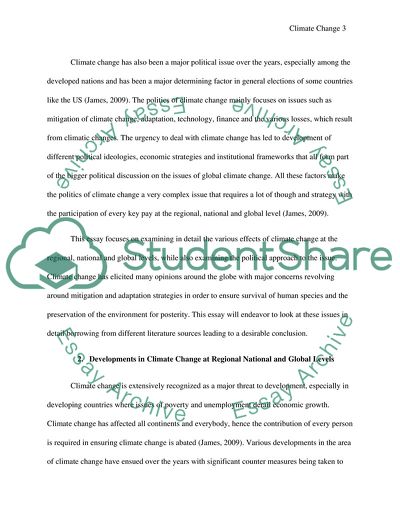Cite this document
(Climate Change Essay Example | Topics and Well Written Essays - 2250 words, n.d.)
Climate Change Essay Example | Topics and Well Written Essays - 2250 words. https://studentshare.org/environmental-studies/1812745-are-the-effects-of-climate-change-at-different-levels-regional-national-and-global-in-terms-of-mitigation-and-adaptation-with-a-focus-on-the-limits-that-the-politicians-face-in-terms-of-implementing-climate-change-regulations-and-frameworks
Climate Change Essay Example | Topics and Well Written Essays - 2250 words. https://studentshare.org/environmental-studies/1812745-are-the-effects-of-climate-change-at-different-levels-regional-national-and-global-in-terms-of-mitigation-and-adaptation-with-a-focus-on-the-limits-that-the-politicians-face-in-terms-of-implementing-climate-change-regulations-and-frameworks
(Climate Change Essay Example | Topics and Well Written Essays - 2250 Words)
Climate Change Essay Example | Topics and Well Written Essays - 2250 Words. https://studentshare.org/environmental-studies/1812745-are-the-effects-of-climate-change-at-different-levels-regional-national-and-global-in-terms-of-mitigation-and-adaptation-with-a-focus-on-the-limits-that-the-politicians-face-in-terms-of-implementing-climate-change-regulations-and-frameworks.
Climate Change Essay Example | Topics and Well Written Essays - 2250 Words. https://studentshare.org/environmental-studies/1812745-are-the-effects-of-climate-change-at-different-levels-regional-national-and-global-in-terms-of-mitigation-and-adaptation-with-a-focus-on-the-limits-that-the-politicians-face-in-terms-of-implementing-climate-change-regulations-and-frameworks.
“Climate Change Essay Example | Topics and Well Written Essays - 2250 Words”. https://studentshare.org/environmental-studies/1812745-are-the-effects-of-climate-change-at-different-levels-regional-national-and-global-in-terms-of-mitigation-and-adaptation-with-a-focus-on-the-limits-that-the-politicians-face-in-terms-of-implementing-climate-change-regulations-and-frameworks.


